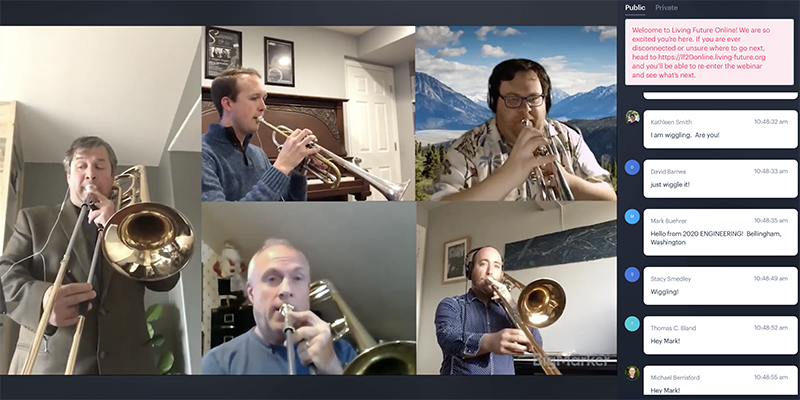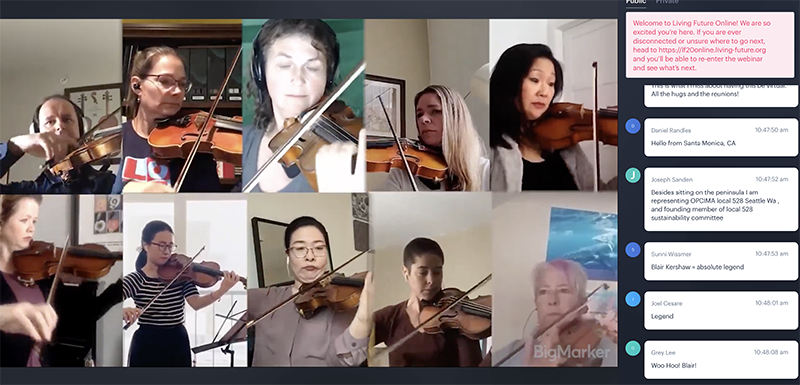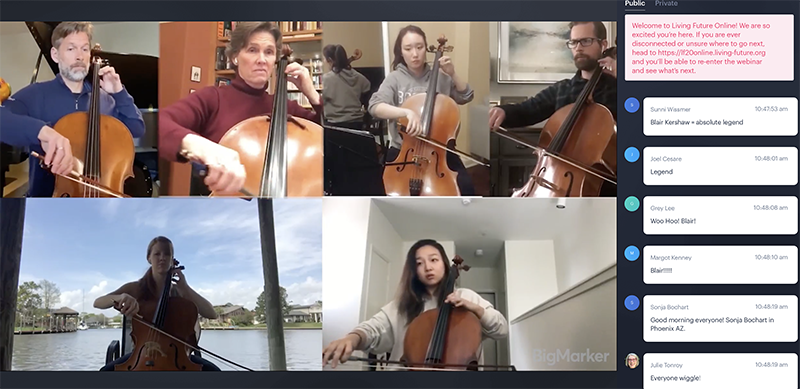Living Future 2020 – An Entirely Online Conference
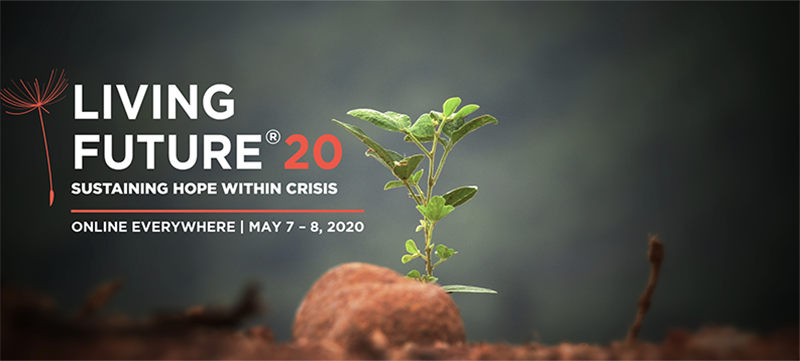
On May 7th & May 8th, the International Living Future Institute (ILFI) held its very first entirely virtual Living Future conference. The annual event, seen as ILFI’s signature gathering, was obviously not originally planned as a virtual experience. However, the tightknit ILFI team and its many supporters made a remarkably comprehensive pivot in the face of the pandemic closures, choosing to create a fully virtual experience for its Living Future attendees instead of cancelling or indefinitely postponing the event.
ILFI and its followers are some of the most enthusiastic people working in the sustainability world. A sense of community defines a lot of what they do. With that in mind, it wasn’t a surprise to us that the Living Future team would take a “show must go on” approach to their pandemic-affected event.
However, we were interested to see how the virtual edition of the conference would work – how the human element would be captured and bottled up, and how the organizers would stay true to the conference identity of years past.
We tuned into the live event throughout the two days to learn more about how the organizers went about putting together such an extensive virtual event.
The Living Future team mirrored their traditional conference style wherever possible regarding programming and schedule format. To attend the conference, attendees paid a fraction of the cost of the conference fee in past years.
The 2020 virtual Living Future conference was every bit of stark juxtaposition between uplifting optimism and technical teaching moments – inspiring calls to action, followed by the specifics of data points, chart-mapping, and real-life responses to barriers to sustainability, as it has been in years past.

The opening plenary and keynote Thursday morning was delivered by Jason F. McLennan, the founder of ILFI.
McLennan referenced the term “zugonruhe” – meaning the inner migratory patterns and behaviors of animals preparing for migration – as a way to see our relationship with climate change so far.
“During the 2000-2010 decade, what we were really doing was preparing for the changes yet to come. It was the last decade we had to completely stop climate change, and we didn’t. The next decade (2010-2019), we entered a new phase – the language had shifted to the mitigation of climate change. In this time, the science around climate change had come of age and the pace of change had also begun to accelerate. We made some great progress, with new technologies like LED lighting, solar, the first living buildings, and electric cars became sexy again. We truly in this decade developed the entire toolkit needed to create a living future. And yet for most of society, these issues still barely register.”
“It’s always my hope to challenge what you think,” McLennan said. “We’ve been building living buildings and changing the way things are done. But now, we’re at an inflection point. For our industry, and for all of humanity.”
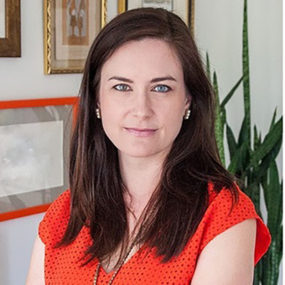
Friday morning, attendees tuned into a second keynote by Katharine K. Wilkinson, Vice President of Communication & Engagement at Project Drawdown and co-writer of the New York Times bestseller “Drawdown: The Most Comprehensive Plan Ever Proposed to Reverse Global Warming.” Ms. Wilkinson’s bio is intriguing:
“Known for her work at the intersection of climate, gender equality, and women’s leadership, Katharine’s TED Talk on the topic has more than 1.5 million views. She currently advises on Mary Robinson’s feminist climate podcast, Mothers of Invention, and is co-editing an anthology of women’s climate wisdom with Dr. Ayana Elizabeth Johnson. In 2019, TIME featured Katharine as one of 15 ‘women who will save the world,’ and Planned Parenthood Southeast named her a ‘legend in the making.’”
“Katharine speaks, moderates, and facilitates across diverse forums, including Aspen Ideas, National Geographic, Skoll World Forum, Talks @ Google, TEDWomen, and the United Nations. Her frequent media appearances include PBS and The Weather Channel, and her writing has been published by BBC, CNN, and TIME among others.”
Ms. Wilkinson spoke about how we humans are making sense of the climate crisis, and
“I think of it as an EKG that is spiking wildly out of range of the natural up-down, up-down that is normal.”
She quoted the American author and activist James Baldwin: “’We’ve made the world we’re living in, and we have to make it over.’”
“We must take responsibility for the transformation that’s required, and Project Drawdown offers us one way to think about that. It helps us ask, ‘Where we are, and where do we want to go?’ At Drawdown, our work aims to provide a resource that taps into tools we already have today to stem or stop climate change. For me the Drawdown Review leaves us with a little bit of a paradox. Climate change is overwhelming; it requires true ambition, and our collective courage.”
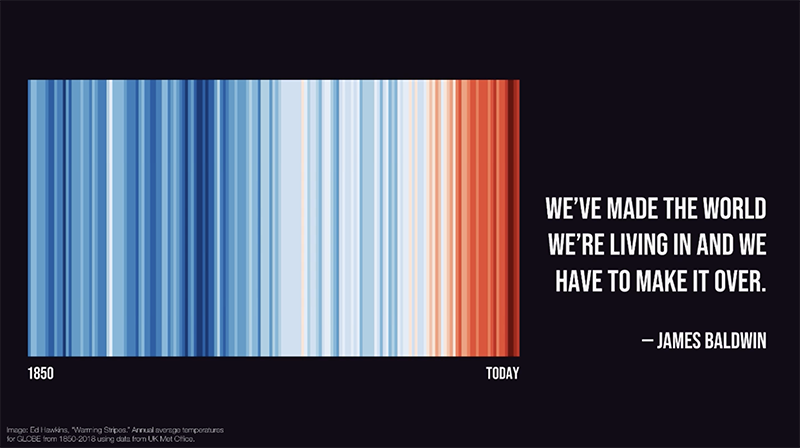
In our fight to restore our climate, Ms. Wilkinson offered seven “Accelerators to Scale Solutions” – or things that must happen in order to be successful:
- Shape Culture
- Build Power
- Set Goals
- Alter Rules & Policies
- Shift Capital
- Change Behavior
- Improve Technology
One of Ms. Wilkinson’s biggest platforms is connecting women with climate change, and how a feminist-oriented leadership strategy could better and more quickly solve climate issues. If interested in learning more about this perspective and her work around the topic, head to her website, www.kkwilkinson.com
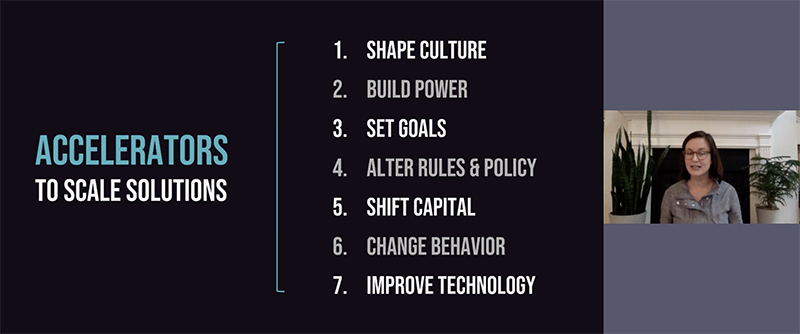
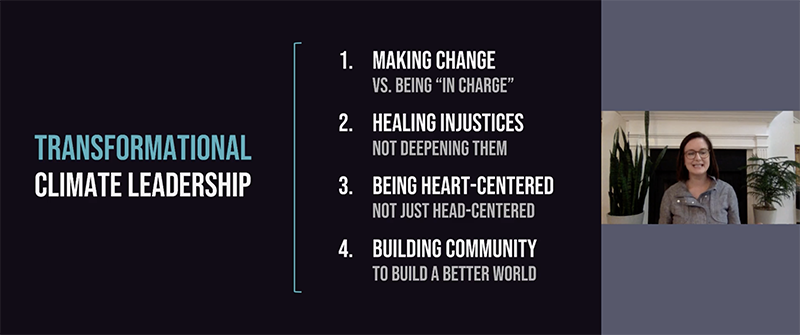
Regular ILFI event attendees are used to a few events that have become rooted traditions at every conference, and these events were still present in the virtual edition of Living Future. An energizing morning meditation Thursday helped kick off the conference; a “Virtual Mural” around lunchtime brought people together to chat and create a map of where everyone tuning-in was located; and Friday’s Big Bang Celebration encouraged people to raise their glasses at home to toast the end of another year of Living Future.
And while some of the celebration events that would normally involve cocktails and/or face-to-face networking, like the Thursday evening “Sing-along Spectacular” with Stacy Smedley, the exhibitor showcase, and Friday’s Big Bang Celebration, left us longing for a traditional conference center, we were pleasantly surprised to find moments that were improved by the virtual experience.
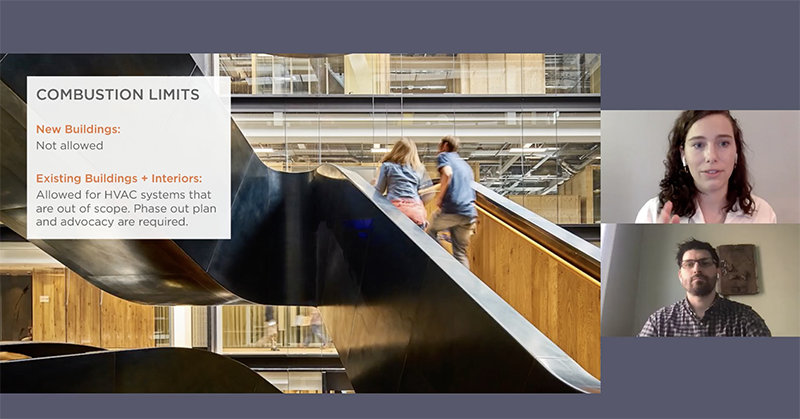
At the online workshop sessions, where Living Future experts present on various topics including how to execute the many ILFI standards and programs, the tone was more relaxed and intimate, and the entire session benefited from the one-on-one feel of a live virtual event with the presenter. We attended a sampling of sessions that caught our eye, including:
>Core Green Building Certification: Achieving High Performance
>Building Organizations that Value Diversity, Equity, and Inclusion with JUST 2.0
>Connecting the Missing Links Between LBC and the Commercial Real Estate Sector
>Climate Journeys: Tales of Displacement Across a Changing Planet with Oxfam America
The Living Future team also took a stab at creating a series of virtual building tours, in place of the many on-site tours the conference typically offers in the host city. Thursday evening, conference attendees were led through three virtual tours of a few of the world’s greenest “living buildings” – the Watershed Building and the Bullitt Center in Seattle, and the Kendeda Building in Atlanta. Following the tours was a live Q&A with the project managers for each site.
Beyond the two-day live conference event on May 7-8, Living Future 2020 also includes a series of summits and session that will be held every Tuesday from May 19 to June 25. Interested parties can choose to attend the full six-week online Session + Summit Series pass, or a one-week access pass, with their choice of week.
“The Living Future 2020 Online Conference started as a 2-day live event and is now being followed by 6 additional weeks of summits and sessions, all focused on green building and sustainability. It is hosted by the International Living Future Institute, the same people who administer the Living Building Challenge.”
“The LF20 Online Summit & Session Series May 19-June 25 is a 6-week series of weekly, 2-day mini-conferences focused on the themes of Health and Vitality, Resilience in Crisis, Closing the Loop, Biophilic Design, Equity and Affordable Housing, and Embodied Carbon. Full schedule and details here.”
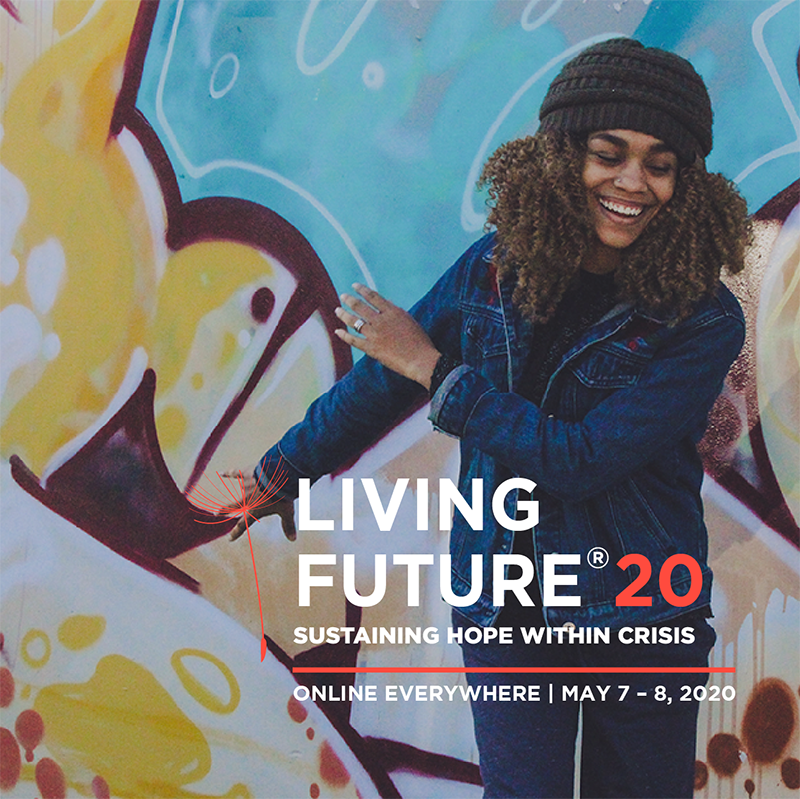 “On Tuesday each week, join us for interactive half-day summits featuring brilliant thought leaders discussing the urgent issues we’re facing now. On Thursdays, come back to attend four 1-hour sessions one after the other, led by the inspiring changemakers in our community. We’ll close each day with a virtual networking social hour.”
“On Tuesday each week, join us for interactive half-day summits featuring brilliant thought leaders discussing the urgent issues we’re facing now. On Thursdays, come back to attend four 1-hour sessions one after the other, led by the inspiring changemakers in our community. We’ll close each day with a virtual networking social hour.”
Bravo to the Living Future and greater ILFI teams for foraying bravely into what could now potentially be a new landscape for large-scale conferencing around the world. While we hope the face-to-face physical conference isn’t a retired concept, we’re happy to see those in the design and sustainability communities stepping forward to innovate and provide a different type of conference experience for our industry.